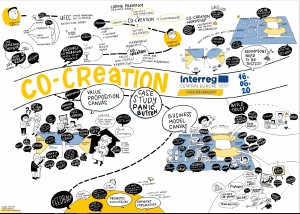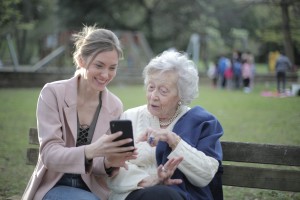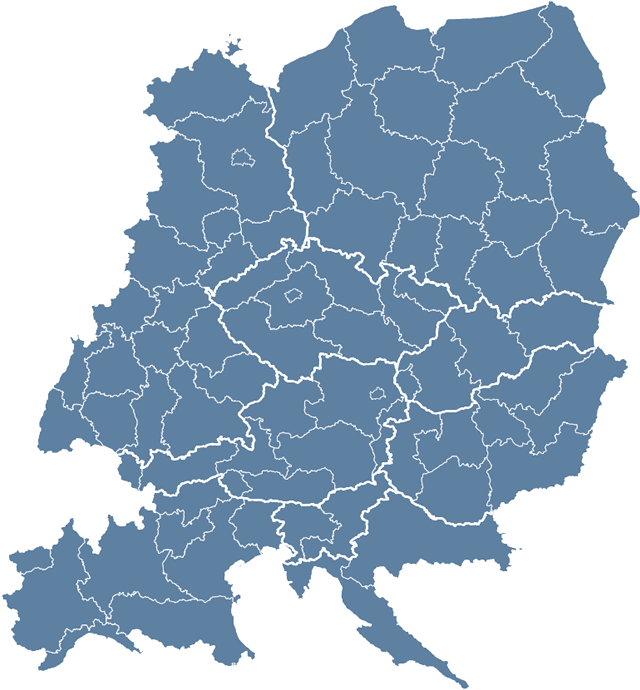innovation ecosystem for smart elderly care
01.05.2019
30.04.2022
The I-CARE-SMART project aimed to enhance innovation ecosystems for the promotion of smart solutions in elderly care in the CE regions.
The project strengthened the capacities of participating regions by enabling public authorities to act as facilitators of innovation, effective mobilisation of the elderly and businesses to bridge the gap between innovators and the target group, launching a quadruple-helix based, user-focused co-creation process for the development of smart elderly care solutions.
The transnational cooperation resulted in project outputs with wide-scale adaptability and transferability. Partners delivered a comprehensive toolset with practical guidance on how to engage seniors and businesses in user-focused co-creation, providing a methodological basis for enhancing innovation ecosystems. The revealed unmet needs of the elderly were matched with innovative solutions and partners launched quadruple-helix-based co-creation sessions and living-lab-type real-life tests with direct interaction between innovators and representatives of the target group, developing 16 smart care solutions.
To encourage transnational collaboration, our regions built a Transnational Open Innovation Platform for Smart Elderly Care (SilverStar Platform), a standardized tool that supports co-creation both on regional &transnational levels, and allows all actors to regularly interact, share knowledge on the unmet needs of the elderly and on the potential solutions to address them, and create transnational collaboration teams for the development of innovative solutions with wide-scale market opportunities.
I-CARE SMART project made it possible to understand the relevant regional contexts and the needs of end users. The experience in the co-creation of innovative solutions allowed the understanding of the local difficulties in fostering innovation, as well as highlighting the common factors between regions that support international exchange and collaboration
i-care-smart in numbers
13 project partners
2 593 039,34
total budget
7 countries
7 strategies
and action plans
19.01.2023
News
Project Summary
With the help of the I-CARE-SMART partners, the Toolbox for Senior Engagement, Toolbox for Business Engagement and the Handbook on Co-Creation & Open Innovation Methods for Smart Elderly Care was prepared to create and knowledge base among partners to foster the existing linkages with businesses, seniors and exploring innovation methods for smart elderly care.

Archive
NEWS|EVENTS
Past news and events
The project strengthened the capacities of participating regions by enabling public authorities to act as facilitators of innovation, effective mobilisation of the elderly and businesses to bridge the gap between innovators and the target group, launching a quadruple-helix based, user-focused co-creation process for the development of smart elderly care solutions.
Here you will find informations about the project activities.

PROJECT OUTPUTS IN NUMBERS
16 pilot smart solutions
tested
1 network
created
2 toolboxes and 1 handbook
developed
1 transnatIonal platform
developed
Project outputs
The I-CARE-SMART project implemented three Thematic Working Groups (Senior Engagement, Business Engagement, Co-creation and Open Innovation Methods) to develop different perspectives in order to empower the partners and Task4 members in strengthening co-creation in elderly care.
T1.1 Toolbox for Senior Engagement
The Toolbox Senior Engagement is based on the results of the summary report for efficient senior engagement. This approach focuses on exploration and implementation. The Toolbox for Senior Engagement will be transferred into training material, addressing Quadruple Helix actors (Task4s) of the six regions Budapest, Prague, Kosice, Liguria, Graz and Lodzkie enabling them to apply senior engagement techniques in the following projects process.
T1.2 Toolbox for Business Engagement
The aim of the Toolbox for Business Engagement in co-creation is to support businesses in being involved in the co-creation processes within all the other members of the quadruple helix.
The toolbox has been designed according to the evidence of the regionals’ research and provides a set of tools focused on business engagement. The proposed tools are : procurement for innovation/ pre-commercial procurement, matching (r&d events), network facilitators model, living lab model, business incubator model.
Contributing partners: SI4LIFE, NOWA, SPEKTRA, Budapest University of Technology and Economics, Medical University of Lodz, Technical University of Kosice.
T1.3 Handbook on Co-Creation & Open Innovation Methods for Smart Elderly Care
This concept paper is twofold, first it shall outline the mission, philosophy and ways to proceed in the TWG to develop a handbook on co-creation for the elderly and older adults, second it provides detailed instructions on carrying out regional analyses on the linkages and cooperation mechanisms within the regional innovation systems and how to collect good co-creation and open innovation practices.
Joint Guideline on the Composition and Operation of Task4s
A joint guideline is needed to set up Regional Quadruple Helix Task Forces (Task4s). This document outlines the key responsibilities of Task4s members and the expectations regarding the experience and qualification of members. It also contains suggested rules of procedure and a detailed work-plan, which ensures a standard workflow among the different regional Task4s.
PILOT ACTIONS
In Hungary, 7 smart solutions were tested in the pilot implementation:
1. the CleverGuard system is a novel smart-home-monitoring solution based on electricity consumption for seniors and their caregivers,
2. CoVCAP is a cloud-based IT solution that connects seniors in need of help with volunteer helpers,
3. ForeStream is a smart camera system developed to recognize and measure the early signs of dementia with the analysis of movement data, helping in prevention and early treatment.
4. InCare is a health monitoring system offering fully integrated solutions for health monitoring, home automation, indoor fall detection, personal agenda with reminders, alerts, caregiver administrative tools.
5. Medistance is a new customized health prevention, care and therapy follow-up system
6. Mental wellness is platform for games developed for the elderly, where that data can be extracted during the game, from which it can be deduced how the player's mental state has changed over time
7. Moniphone is a mobile phone with a traditional exterior, which is easy to use by the elderly, but inside it is very modern system to monitor, transfer vital signs and event signals to the supervisory body every hour or even every minute if needed.
In Austria, 3 pilots were developed:
8. SPROUT developed the prototype of a smart rolling walker to assist seniors in staying mobile even with impairments,
9. “Memorebox” developed an easy-to-use therapeutic gaming software solution that reduces the risk of falling, reduces cognitive decline and promotes social inclusion.
10. NOWA integrated senior user needs in the development of service offers for seniors.
11. The pilot NEAR2U tested in Italy aims to help seniors to orient themselves and enjoy their city with confidence, extending the safe area where people with mild cognitive decline can move freely without risk.
12. The pilot in Slovakia focused on supporting the Institute of Active Housing in the process of developing the Center for support of social rehabilitation in Obišovce and services provided in the centre.
In the Czech Republic 3 pilot projects were implemented:
13. In the AJPACH – assistive unit for users with Alzheimer´s disease pilot, the work focused one testing the usability of the device in social care services, the proof-of-concept operation of the cognitive training and testing part of the device among seniors with cognitive impairment.
14. VR Senior Pack is a set of VR applications for seniors and the aim of the pilot was to select contents for a completely new application in the set which is meant to mediate music to the end users.
15. Careos assistive system is interactive monitoring device to be used in households.
16. In Poland, the tested solution was SeniorApp, a mobile phone app for senior citizens and their families helping them find help with everyday issues and care quickly.
Project Partners
I-CARE-SMART project has 13 partners and 9 associated partners from 7 regions
PROJECT PARTNERS
lead partner
Municipality of Ujbuda, Hungary
Újbuda is the most populated district of the Hungarian capital city of Budapest. With 30% of its inhabitants belonging to the 60+ age group, the city faces the challenge of the ageing society, which prompted the Municipality of Újbuda to create a local strategy for the elderly called “Újbuda 60+ Programme”.
Our website: www.ujbuda.hu
pp 2
Budapest University of Technology and Economics, Hungary
- Its main mission is to educate professionals for the industry in the disciplines of technology, informatics, natural sciences, economics, business and management. The university also cultivates the sciences, to make scientific research, which encompasses fundamental and applied research, technological product and service development, and exploitation of results making up the innovation chain.
Our website: www.bme.hu
pp 3
lodzkie Region, Poland
Plays a key role in the shaping of regional policy through the
preparation and drafting of the most important regional strategic documents, incl. the Regional Innovation Strategy for Lodzkie Region (LORIS 2030). LORIS emphasises the role of the silver economy in the region’s development. Aging is an issue of special concern for LR, as it has one of highest and fastest rising proportion of elderly
in Poland (above 25%).
Our website: www.bruksela.lodzkie.pl
pp 4
medical university of lodz, Poland
Is one of the largest medical universities in Poland active in education, research, training and healthcare. Aging is one of the key
research subjects of MUL.
The Healthy Ageing Research Centre was established for
interdisciplinary research in 2011. MUL has substantial experience in multi-sector cooperation with partners for active aging and is well embedded in EU innovation networks.
Our website: www.en.umed.pl
pp 5
european grouping of territorial cooperation via carpatia, slovakia
- Under the agreement of the statutory countries, the founding members of the European Grouping of Territorial Cooperation Via Carpatia are the Košice Self-governing Region and the county of Borsod-Abaúj-Zemplén. Our goal is to enhance economic and social coherence, especially through the realization of projects and programs of cross-border cooperation.
Our website: www.viacarpatia.eu
pp 6
technical university of kosice, slovakia
One of the leading Slovak public technical university, which caters for a wide range of educational and research needs throughout Slovakia and Central Europe region and has very strong linkages to national and regional policymakers and actively cooperates on shaping national and regional S3s and R&D&I policies.
Our website:
www.tuke.sk
pp 7
liguria region, italy
Liguria Region (RL) governs the regional public health system and ensures coordination and cooperation among different actors involved in the health sector, playing a coordinating role in the regional innovation ecosystem. Due to its large senior population, Liguria is an extraordinary test bed for innovation targeting the elderly.
Our website: www.regione.liguria.it
pp 8
si4life, italy
Is an Innovative SME and a regional consortium of SMEs with the primary aim to carry out basic research, translational and applied, for supporting the quality of life of older adults and people with sensory, neuro-motor, cognitive and / or mental disabilities. The Consortium includes RTDs, representatives of end users and other SME active in ICT sector.
Our website: www.si4life.it
p 9
social services prague 9, czech republic
Is a non-governmental, non-profit institution providing care and support to more than 1100 senior citizens in the form of residential as well as domiciliary and respite care services. The organization also operates a shelterered housing scheme for the elderly and a leisure time educational centre providing range of leisure time activities and lifelong education.
Our website: www.ssspraha9.cz
pp 10
spektra, manufacturing cooperative, czech republic
Spektra, cooperative of the blind, was founded in 1989. At the beginning, Spektra specialized in developing, manufacturing and distribution of assistive equipment for visually impaired people, and extended its activities in helping people with speech and finger impairments during last 7 years.
Our website: www.spektra.eu
pp 11
city of graz, austria
- The department for Women & Equality is the specialist office for women's promotion and equality in the city of Graz. In collaboration with experts and specific institutions, the promotion of women and gender equality is being driven forward with conviction, innovation and expertise.
- Our website: www.graz.at/frauen
The geriatric health centers of the city of Graz (GGZ) are competence centers for aging medicine and care. The company is divided into three business areas: hospitals, nursing homes and day centers as well as alternative forms of living for elderly.
Our website: www.ggz.graz.at
pp 12
nowa training counselling project management, austria
Is a non-partisan and non-profit association to which the city of Graz and municipalities of the district Graz-Umgebung belong. nowa is committed to equality between women and men in the labour market, education, business and regional development.
Our goal is to contribute to a gender democratic society in which learning, development and career is possible without structural disadvantages and limiting attributions.
Our website: www.nowa.at





